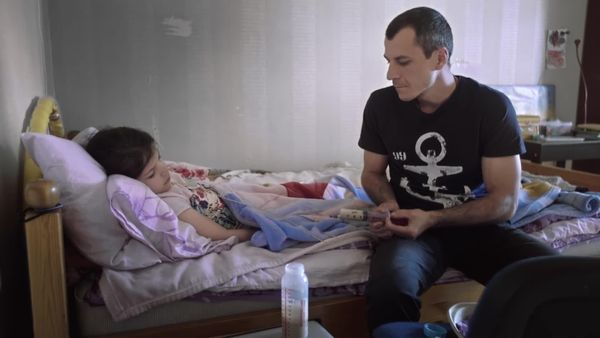Eye For Film >> Movies >> Life Overtakes Me (2019) Film Review
Life Overtakes Me
Reviewed by: Jennie Kermode

Above a bed in a pink-walled room, posters cling to the wall. A smiling photograph looks out from them. They look like pleas for help in finding a missing child, but the child is right there underneath them - in body, anyway.
Known locally as uppgivenhetssyndrom and also called traumatic withdrawal, resignation syndrome has been affecting children in Sweden for some two decades. It has been a big issue in national media, attracting the same kind of disbelief and denial as chronic fatigue syndrome (for which causes have since been pinpointed). The controversy is greater because it almost exclusively affects children in one distinct group: asylum seekers.

In this Oscar-nominated short documentary, John Haptas and Kristine Samuelson meet the families of several affected children and get to know their stories whilst observing parts of the day to day care and support provided to the children themselves. They also present a number of experts who share their views on the phenomenon, agreeing that the condition is real and that it appears to develop as a response to trauma exacerbated by a prolonged climate of uncertainty which prevents them from undergoing a normal psychological recovery and feeling safe again. listening to accounts of what the parents went through and what the children saw, it's easy to understand how it could have such a profound effect. Its impact on the mental health of the adults is notably absent from discussion but one imagines that their struggle to hold onto hope would have compounded the children's sense of despair.
Watching the children go through response tests and physiotherapy, it's difficult to imagine that they're faking it. They exhibit differing degrees of awareness and cognitive function, one of them able to swallow food with the right support, one with a pulse that speeds up when people are active around her, two not reacting at all when cold objects are placed on their stomachs. Lacking the wear and tear associated with active kids, their skin looks like porcelain, enhancing their doll-like quality and giving the situation a still more uncanny aspect. Signs of who they used to be surround them: photographs fro a swimming competition, favourite toys, Disney princess bedding. One girl's sister reads her stories, coming along impressively in what is not just her second language but her second alphabet, keen to share even though she doesn't know if she's being heard.
Why do some children respond like this when others don't? Why is it so much more common in Sweden (and perhaps Australia) than it is elsewhere? There are a lot of unanswered questions. Wisely, the film doesn't attempt to answer them, simply setting out the facts as they are understood and inviting empathy. This open-ended approach helps to situate the film in the wider context of a world that is facing new kinds of trauma, making us wonder if there is, in the end, only so much that any of us is equipped to cope with. One is left with the disturbing feeling that these children may simply be the canaries in the coal mine.
Reviewed on: 27 Jan 2020














